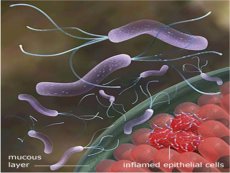Medical expert of the article
New publications
A gut bacterium may protect against stroke
Last reviewed: 01.07.2025

All iLive content is medically reviewed or fact checked to ensure as much factual accuracy as possible.
We have strict sourcing guidelines and only link to reputable media sites, academic research institutions and, whenever possible, medically peer reviewed studies. Note that the numbers in parentheses ([1], [2], etc.) are clickable links to these studies.
If you feel that any of our content is inaccurate, out-of-date, or otherwise questionable, please select it and press Ctrl + Enter.

A new study by researchers at New York University suggests that a particular strain of the spiral-shaped gram-negative bacterium Helicobacter Pylori, which infects various areas of the stomach and duodenum, may protect people from stroke and some types of cancer.
The experts' conclusions are based on a large-scale study involving 10,000 people, whose health was monitored by experts over a period of twelve years. The results of the study were published on January 9 in the journal "Gut".
According to the scientists, those subjects who were found to have a virulent strain of Helicobacter Pylori had a 55% lower risk of death from stroke compared to those who were not infected. In addition, the presence of this strain in the body also reduced the risk of death from lung cancer by 45%.
According to the study's lead authors, Dr. Yu Chen, Associate Professor of Population Health and Environmental Medicine, and Dr. Martin Blaser, MD, Professor of Microbiology, these are very unexpected results and at the same time simply amazing.
Previous research initiated by Dr. Blazer has confirmed the link between bacteria that cause stomach diseases and the development of stomach ulcers, which can later lead to cancer.
Current research by experts shows that Helicobacter pylori bacteria can protect children from asthma thanks to the cagA gene, which encodes one of the most important virulence proteins of Helicobacter pylori.
“This finding is very important,” the researchers said. “We found that Helicobacter pylori increased the risk of dying only from stomach cancer, a cancer that is currently uncommon in the United States. We also found that Helicobacter pylori infection was associated with a reduced risk of lung cancer and stroke.”
The spiral shape of the Helicobacter pylori bacterium facilitates its penetration into the mucous membrane of the stomach and duodenum, and also facilitates movement in the mucous gel that covers the gastric mucosa.
To better understand the impact of Helicobacter pylori infection on the human body, experts analyzed data from 9,895 people who took part in the National Health and Nutrition Examination Surveys conducted between 1988 and 1994.
Scientists found no evidence of a direct link between Helicobacter pylori and overall mortality rates in the population. Participants in the studies, including those who had this strain in their bodies and those who did not, were equally at risk of premature death from various causes. However, Helicobacter pylori infection still increased the risk of death from stomach cancer by forty percent.
“The most interesting thing was that there was a strong inverse relationship with stroke that could be called protective,” says Dr. Blaser. “It is possible that this protection is mediated by the same cells that protect against asthma, but this finding needs to be confirmed in clinical trials.”


 [
[